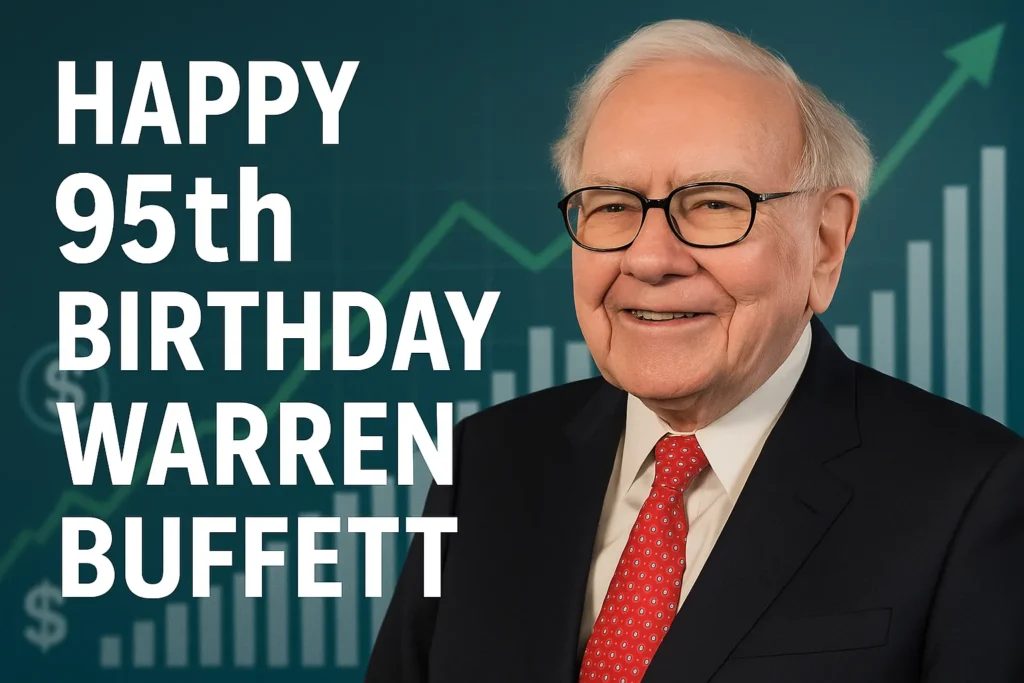When we celebrate Warren Buffett 95, we are not just recognizing the birthday of one of the wealthiest men alive. We are honoring a philosophy of patience, discipline, and clarity in investing that continues to guide generations. Buffett is more than a billionaire. He is an educator, a critic of reckless capitalism, and a rare voice of reason in an age obsessed with quick profits.
Context: The Making of an Oracle
Warren Edward Buffett was born on August 30, 1930, in Omaha, Nebraska. His early interest in numbers, businesses, and markets became legendary. At age 11, he bought his first stock—Cities Service Preferred—teaching him the brutal lesson of panic selling and the wisdom of holding.
The mainstream narrative frames Buffett as a gifted prodigy who turned Berkshire Hathaway into a multi-trillion-dollar empire. He learned from Benjamin Graham, the father of value investing, at Columbia Business School. Graham’s principle—that a stock is worth more than the whims of the market—became Buffett’s lifelong mantra.
Berkshire Hathaway itself was originally a failing textile company. Buffett bought it cheap, and instead of clinging to textiles, he pivoted it into an investment holding giant. Today, it owns or controls stakes in American Express, Coca-Cola, Apple, Geico, BNSF Railway, and dozens more.
According to Forbes, Buffett’s net worth exceeds $130 billion, yet he still lives in his Omaha home purchased in 1958. His very lifestyle became symbolic of his philosophy: simplicity beats extravagance, substance over style Forbes.
Oppositional Argument: Buffett vs. the Mania
At Warren Buffett 95, the mainstream praise is predictable: the Oracle of Omaha, the most successful investor, the master of value. But this praise misses the deeper truth—Buffett is not the market’s prophet; he is its critic.
Buffett refused to bow to speculative frenzies. During the dot-com bubble, when Wall Street was intoxicated with internet startups, he abstained. Critics mocked him as “out of touch.” A few years later, when the bubble burst, he was vindicated.
He once declared: “The stock market is designed to transfer money from the Active to the Patient.” That phrase is not Wall Street marketing. It is a rebuke of Wall Street’s addiction to volume, commissions, and hype.
Buffett’s philosophy is not about worshiping capitalism’s chaos. It is about disciplining it. At Warren Buffett 95, the lesson is clear: his defiance of speculation was the true genius.
Analytical Breakdown: Three Dimensions of Buffett’s Legacy
1. Discipline Over Hysteria
Buffett’s golden rule—“Be fearful when others are greedy, and greedy when others are fearful”—summarizes decades of investing discipline. He consistently rejected manias: dot-com, crypto hype, meme stocks. His focus was on businesses with cash flow, not circus valuations.
2. Capital Allocation as Art
Through Berkshire Hathaway, Buffett transformed capital allocation into an art. Insurance “float” became his secret weapon, a cheap source of capital to reinvest. His acquisitions—like See’s Candies or BNSF Railway—were boring to speculators but spectacular for compounding wealth.
3. Philanthropy as Critique
Buffett pledged to donate 99% of his fortune, mostly via the Gates Foundation. Unlike many billionaires who hoard wealth, Buffett’s philanthropy became a direct critique of excess. “If you’re in the luckiest 1% of humanity, you owe it to the rest to think about the other 99%.”
This was not a saintly act but a rational stance. He saw billionaire hoarding as economic rot.
Human Perspective: Buffett’s Life as a Statement
At Warren Buffett 95, the image of a billionaire living in a modest Omaha house matters more than any balance sheet. He eats McDonald’s breakfasts, drinks Cherry Coke, and plays bridge. These details are not trivia—they are his philosophy materialized.
He never chased yachts or private islands. He demonstrated that wealth can coexist with ordinariness. This lifestyle is a critique of the toxic culture of billionaire excess. It makes Buffett relatable, even as his wealth towers above.
Stories abound of Buffett’s directness. He once told students: “The best investment you can make is in yourself.” He encouraged reading, curiosity, and patience. Unlike Wall Street gurus selling “secret formulas,” Buffett democratized wisdom.

Counterarguments
Critics argue Buffett’s success was a product of timing. Born in the Great Depression, he invested in America’s post-war boom. Others note his hypocrisy: owning fossil fuel businesses while speaking of sustainability, or holding Coca-Cola while obesity skyrockets.
These criticisms have merit. Buffett is no saint. He is pragmatic, sometimes too pragmatic. Yet the essence remains: his worldview was consistent, his strategy transparent, and his results undeniable.
Buffett’s Words: Timeless Advice
On turning 95, his most quoted lessons still guide investors:
- “Rule No.1: Never lose money. Rule No.2: Never forget Rule No.1.”
- “Price is what you pay. Value is what you get.”
- “Someone is sitting in the shade today because someone planted a tree a long time ago.”
- “Risk comes from not knowing what you are doing.”
These are not slogans; they are operating principles. They expose the hollowness of modern financial fads.
Buffett’s Global Impact
Warren Buffett 95 reminds us his influence extends beyond Omaha. His annual letters are studied in Beijing as much as in Boston. His philosophy of patience resonates across cultures.
Yet, paradoxically, many investors admire Buffett while ignoring his teachings. They praise his patience but chase quick gains. They cite his long-termism but worship quarterly earnings. In this lies the tragedy: Buffett is quoted more than he is followed.
Conclusion: A Salute to the Contrarian
At 95, Warren Buffett is not just a billionaire. He is a reminder that investing is not gambling, that patience is not weakness, and that humility can accompany wealth. He remains the counter-voice in a financial world drowning in noise.
As a company, we salute Warren Buffett at 95. Not for his billions, but for his discipline. Not for his fame, but for his defiance of hysteria. In honoring him, we embrace his lesson: true wealth is built not by frenzy, but by reason.
Happy 95th, Mr. Buffett. The Oracle of Omaha still teaches us how to resist the madness.
